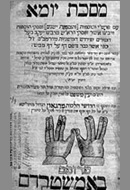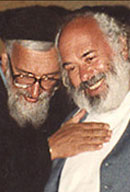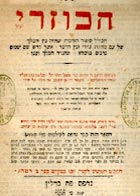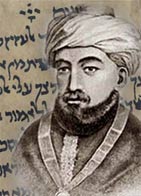Medieval Thinkers
 The Persian Talmud
The Persian TalmudTuesday, November 2, 2010 by Yehudah Mirsky | Jewish Ideas Daily » Daily Features
A recent gathering of scholars who have been intensely researching the buried treasures of "Irano-Judaica," together with the release of a volume titled The Talmud in its Iranian Context, underscores one of the most exciting developments in Jewish studies: the effort to put the "Babylonia" back into the Babylonian Talmud.
 Romancing Hasidism
Romancing HasidismThursday, October 7, 2010 by Allan Nadler | Jewish Ideas Daily » Daily Features
Hasidism has a long history of concurrently repelling and enchanting modern Jews. Today, its distinguishing features—isolationism, religious fanaticism, and aggressive rejection of all things modern, including not only non-Orthodox Judaism but the very idea of secularity—are inexplicable, if not abhorrent, to much of world Jewry.
 Yehuda Halevi
Yehuda HaleviMonday, February 22, 2010 | Jewish Ideas Daily » Daily Features
How golden was the Jewish "Golden Age" of Spain: roughly, the 10th–11th centuries C.E.? In the era's once-popular reputation for Muslim-Christian-Jewish tolerance and coexistence (convivencia), it is increasingly easy to see an overused and overstated fiction; more and more, scholarship reveals just how conflicted a time it was, and how conditional was the "tolerance" extended to minority communities. Still, for Jews as for others it truly was a period of amazing cultural creativity and accomplishment, all the more astonishing in light of convivencia's constraints. Under Muslim rule, the most innovative Jewish achievements lay in the realms of poetry and philosophy. Standing at the summit of both,...
 Mediterranean Maimonides
Mediterranean MaimonidesTuesday, January 26, 2010 | Jewish Ideas Daily » Daily Features
Civilizations come and go. Their greatest surviving creations remain. Such is the case with the work of Maimonides (1135–1204), a towering thinker, known to Jewish tradition as "the Great Eagle," who continues to defy easy characterization. Two new biographies depart from past treatments to situate the thought of this master philosopher within the Arabic civilization of his time, and more generally in the prism of the Mediterranean world. To the late scholar Shlomo Dov Goitein, the Mediterranean was a gracious, cross-cultural society that reached its apotheosis in the person of Maimonides' son Abraham, a Jewish devotee of Sufism. To Maimonides' more recent biographers, it...
 The Harshness of Creation
The Harshness of CreationLike the 2004 tsunami that devastated southeast Asia, yesterday's catastrophic earthquake in Haiti, a poverty-stricken country with a legacy of home-grown violence and suffering, inevitably provoked the terrible question: where was God? One answer derives from Jewish religious sources, and specifically from the teachings of the Kabbalah. It has to do with tzimtzum, or contraction: that is, God's own contraction and limitation of Himself in order to make space for the finite—and invariably flawed—worlds of physical nature and human action. The idea was most famously developed in Safed, Palestine by the 16th-century kabbalist Isaac Luria as part of a complicated, esoteric myth...
Editors' Picks
Evil Urge Amit Gevaryahu, Talmud Blog. A new work tackles one of the most entrenched myths in the academic study of Jewish sources: namely, that Judaism has historically been a sex-positive religion.
Hope Springs Talmudic Shai Secunda, Jewish Week. Unfolding beyond the crush of defeat, the Talmud's vigorous spirit of inquiry represents a great, resilient optimism.
Plato and the Talmud Alan Avery-Peck, Review of Biblical Literature. Philosophically, "Athens" and "Jerusalem" represent wholly incompatible viewpoints on the truth. Not so, argues a new book. (PDF)
Forgive Me Moshe Halbertal, Jewish Review of Books. In explaining the laws of forgiveness, the Talmud relies on stories, adding uncommon depth not only to the law but to the theme of forgiveness itself.
Choose Life, Choose Work Haim Amsalem, Jerusalem Post. Traditional Jewish sources unequivocally stress the virtue of work and the value of earning a living. Any movement teaching its children only Torah is a modern aberration.
Is Judaism a Religion? Leora Batnitzky, Jewish Week. A common assumption is that Judaism began as a religion and only gradually grew into something more broad. But this has it exactly backward.
Protestant Mishnah Amit Gevaryahu, Talmud Blog.
Can the ancient rabbinic code of law be studied on its own, apart from the commentaries, deliberations, and disputes of the Talmud?
Polygamy Now? Gil Student, Torah Musings. Calls for lifting the Jewish ban on polygamy may respond to a felt need, but violate a millennium-old proscription that protects the dignity and rights of women.
Teiku Gil Student, Torah Musings. In matters of faith, we must often acknowledge that, in company with some of the greatest rabbis, we do not have answers. (Others beg to differ.)
The Tale of Maimonides and Peter Fred MacDowell, On the Main Line. Was the great religious philosopher a heretic, as some medieval rabbis thought? A legend extant in many versions tells how he dramatically and successfully dispelled the charge.

